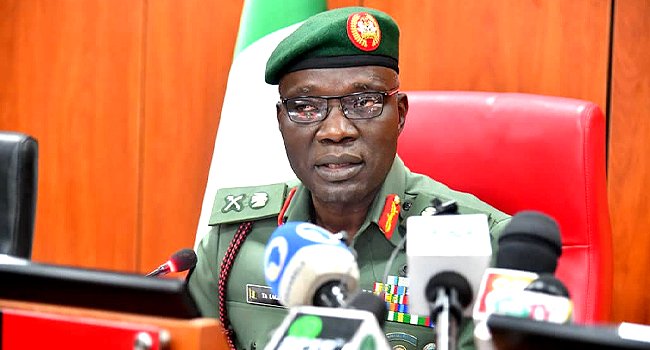Army commander orders heritage centre to focus on innovation.
Lt.-Gen. Taoreed Lagbaja, the Chief of Army Staff (COAS), has charged the Nigerian Army Heritage and Future Centre (NAHFC) with conducting a comprehensive assessment of the policies, practises, and processes currently in place within the Nigerian Army that could be improved to increase its effectiveness.
With the subject “Transforming the Nigerian Army Heritage and Future Centre from Dream to Reality,” Lagbaja issued the order at the center’s inaugural seminar on Thursday in Abuja.
According to him, retired Lt.-Gen. Faruk Yahaya, the previous Chief of Army Staff (COAS), conceived of and built the centre so that it could act as a think tank where new ideas, policies, and tactics for the army could be developed.
Terrorism, banditry, kidnapping, farmer/herder confrontations, and oil theft are just some of the many security threats he claims the army must deal with across the country right now.
I am confident that the study of policies, practises, and procedures, as well as the proposal of fresh and realistic choices through innovation and the application of technology, will improve the capabilities of the Nigerian Army as a result of today’s event.
“The mission of NAHFC is to serve as a research hub for the generation of ideas, policies, and strategies, leveraging the core competencies of the army to defeat current and future threats while preserving its heritage,” he explained.
According to Lagbaja, the centre’s vision and his guiding philosophy can be better understood if fresh ideas and outcomes are generated during the initial lecture and subsequent interactive session.
His goal as commander is “to transform the Nigerian Army into a well-trained, equipped, and highly-motivated force towards achieving our constitutional responsibilities within a joint environment.”
He advised the NAHFC’s officials and other personnel to take advantage of the resource individuals’ expertise for the betterment of the organisation as a whole.
He claims that NAHFC is the first facility of its kind in West Africa, and as such, its employees have a responsibility to raise the bar so that the centre can compete with the best in the world.
I know that this group of officers is made up of hard-working, dedicated men and women who are capable of bringing the army to new heights.
As the centre begins its work, I want to reassure you of my unwavering backing.
He also said that the center’s employees would be given opportunities like seminars, workshops, and field excursions so that they could learn knowledge and provide useful suggestions to the Nigerian Army.
According to Maj.-Gen. Obinnna Ajunwa, the Director-General of NAHFC, the centre was established as a research hub to address certain thematic concerns of the army through research, analysis, and policy formulations aimed at achieving the best possible results in terms of both operations and administration.
According to Ajunwa, the COAS’s command philosophy is reflected in the seminar’s aim, which was to drive home the intent of the founding fathers and the establishment mission of the centre in support of the army.
Since taking office on July 18, he has been physically in touch with certain senior officers, both active and retired, and has been reading pertinent documents and committee reports to figure out how to make the founders’ vision a reality, he added.
I’ve formed a number of task forces to look into specific issues that have been raised by the command centre and any ambiguities that could have a future bearing on the army’s operational and administrative functions.
The Future Warfare and Modernization of the Nigerian Army in the Next 10 Years” was the most recent in a series of lectures we gave on current security concerns of relevance to the military.
The findings thus far have been encouraging, and they will undoubtedly contribute to reorienting the army’s policies and decisions in light of new thematic threats.
In a complicated and uncertain security environment, the destiny of the Nigerian army will be cast in the facility, and “we are determined to make the centre a hub for research on past military exploits,” he said.
Yahaya was present, and the lecture was given by retired Maj.-Gen. Anthony Omozoje, who formerly served as Chief of Policy and Plans (Army).




